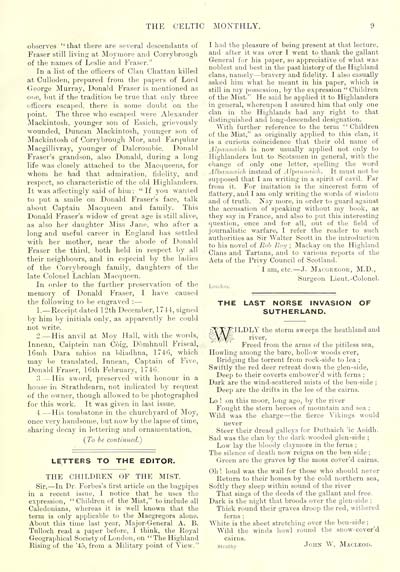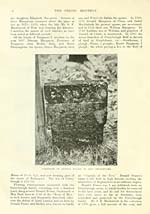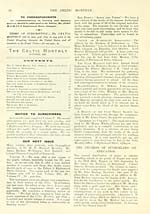Blair Collection > Celtic monthly > Volume 6, 1898
(21)
Download files
Complete book:
Individual page:
Thumbnail gallery: Grid view | List view

THE CELTIC MONTHLY.
observes " that there are several descendants of
Eraser still living at Moymore and Corrybrough
of the names of Leslie and Eraser.''
In a list of the officers of Clan Chattan killed
at Culloden, prepared from the papers of Lord
George Murray, Donald Eraser is mentioned as
OTie, but if the tradition be true that only three
officers esca])ed, there is some doubt on the
point. The three who escaped were Ale.xander
Mackintosh, younger son of E.ssich, grievously
wounded, Duncan Mackintosh, j'ounger son of
Mackintosh of Corrybrough Mor, and Earquhar
Macgillivray, younger of Dalcrouibie. Donald
Eraser's grandson, also Donald, during a long
life was closely attached to the Macqueens, for
whom he had that admiration, fidelity, and
■respect, so characteristic of the old Highlanders.
It was aftectingly said of him : " If you wanted
to put a smile on Donald Eraser's face, talk
about Captain Macqueen and family. This
Donald Eraser's widow of great age is still alive,
as also her daughter I\Iis.s Jane, who after a
long and useful career in England has settled
with her mother, near the abode of Donald
Eraser the third, both held in respect by all
their neighbours, and in especial by the ladies
of the Corrybrough family, daughters of the
late Colonel Lachlan INIacqueen.
In order to the further preservation of the
memory of Donald Eraser, I have caused
the following to be engraved : —
1. — Receiptdated 12th December, 1744, signed
by him by initials only, as apparently he could
not write.
2. — His anvil at Moy Hall, with the words,
Innean, Caiptein nan C6ig, Domhnull Eriseal,
16mh Dara mhios na bliadhna, 174G, which
may be translated, Innean, Captain of Eive,
Donald Eraser, 16th February, 174G.
3 — His sword, preserved with honour in a
house in Strathdearn, not indicated by request
of the owner, though allowed to be photographed
for this work. It was given in last issue.
4. — His tombstone in the churchyard of Moy,
once very handsome, but now by the lapse of time,
.sharing decay in lettering and ornamentation.
(To be continued.)
LETTERS TO THE EDITOR.
THE CHILDREN OF THE MIST.
Sir, — In Dr. Forbes's first article on the bagpipes
in a recent issue, I notice that he uses the
expression, " Children of the Mist," to include all
Caledonians, whereas it is well known that the
term is only applicable to the Macgregors alone.
About this time last year, Major-General A. B.
Tulloch read a paper before, I think, the Royal
Geographical Society of London, on "The Highland
Rising of the '45, from a Military point of View."
I had the pleasure of being present at that lecture,
and after it was over I went to thank the gallant
General for his paper, so appreciative of what was
noblest and best in the past history of the Highland
clans, namely — bravery and fidelity. I also casually
asked him what he meant in his paper, which is
still in my possession, by the expression " Children
of the Mist." He said he applied it to Highlanders
in general, whereupon I assured him that only one
clan in the Highlands had any right to that
distinguished and long-descended designation.
With further reference to the term ' ' Children
of the Mist," as originally applied to this clan, it
is a curious coincidence that their old name of
AipcDimiich is now usually applied not only to
Highlanders but to Scotsmen in general, with the
change of only one letter, spelling the word
Albaiuuiich instead of Alpaiiuaii-li. It must not be
supposed that I am writing in a spirit of cavil. Far
from it. For imitation is the sincerest form of
flattery, and I am only ivriting the words of wisdom
and of truth. Nay more, in order to guard against
the accusation of speaking without my book, as
they say in France, and also to put this interesting
question, once and for all, out of the field of
journalistic warfare, I refer the reader to such
authorities as Sir Walter Scott in the introduction
to his novel of Eoh Ilutj ■ Mackay on the Highland
Clans and Tartans, and to various reports of the
Acts of the Privy Council of Scotland.
I am, etc. — J. MAroREOOR, M.D.,
Surgeon Lieut. -Colonel.
THE LAST NORSE INVASION OF
SUTHERLAND.
^TJP-yPILDLY the storm sweeps the heathland and
'^i^/'\W' river.
Freed from the arras of the pitiless sea,
Howling among the bare, hollow woods ever.
Bridging the torrent from rock-side to lea ;
Swiftly the red deer retreat down the glen-side.
Deep to their coverts embower'd with ferns ;
Dark are the wind-scattered mists of the ben-side ;
Deep are the drifts in the lee of the cairns.
Lo ! on this moor, long ago, by the river
Fought the stern heroes of mountain and sea ;
Wild was the charge — the fierce Vikings would
never
Steer their dread galleys for Duthaich 'ic Aoidh.
Sad was the clan by the dark- wooded glen-side ;
Low lay the bloody claymore in the ferns ;
The silence of death now reigns on the ben- side ;
Green are the graves by the moss cover'd cairns.
Oh ! loud was the wail for those who should never
Return to their homes by the cold northern sea.
Softly they sleep within sound of the river
That sings of the deeds of the gallant and free.
Dark is the night that broods over the glen-side ;
Thick round their graves droop the red, withered
ferns ;
White is the sheet stretching over the ben-side ;
Wild the winds howl round the snow-cover'd
cairns.
Stlathy
JoHir W. Macxeod.
observes " that there are several descendants of
Eraser still living at Moymore and Corrybrough
of the names of Leslie and Eraser.''
In a list of the officers of Clan Chattan killed
at Culloden, prepared from the papers of Lord
George Murray, Donald Eraser is mentioned as
OTie, but if the tradition be true that only three
officers esca])ed, there is some doubt on the
point. The three who escaped were Ale.xander
Mackintosh, younger son of E.ssich, grievously
wounded, Duncan Mackintosh, j'ounger son of
Mackintosh of Corrybrough Mor, and Earquhar
Macgillivray, younger of Dalcrouibie. Donald
Eraser's grandson, also Donald, during a long
life was closely attached to the Macqueens, for
whom he had that admiration, fidelity, and
■respect, so characteristic of the old Highlanders.
It was aftectingly said of him : " If you wanted
to put a smile on Donald Eraser's face, talk
about Captain Macqueen and family. This
Donald Eraser's widow of great age is still alive,
as also her daughter I\Iis.s Jane, who after a
long and useful career in England has settled
with her mother, near the abode of Donald
Eraser the third, both held in respect by all
their neighbours, and in especial by the ladies
of the Corrybrough family, daughters of the
late Colonel Lachlan INIacqueen.
In order to the further preservation of the
memory of Donald Eraser, I have caused
the following to be engraved : —
1. — Receiptdated 12th December, 1744, signed
by him by initials only, as apparently he could
not write.
2. — His anvil at Moy Hall, with the words,
Innean, Caiptein nan C6ig, Domhnull Eriseal,
16mh Dara mhios na bliadhna, 174G, which
may be translated, Innean, Captain of Eive,
Donald Eraser, 16th February, 174G.
3 — His sword, preserved with honour in a
house in Strathdearn, not indicated by request
of the owner, though allowed to be photographed
for this work. It was given in last issue.
4. — His tombstone in the churchyard of Moy,
once very handsome, but now by the lapse of time,
.sharing decay in lettering and ornamentation.
(To be continued.)
LETTERS TO THE EDITOR.
THE CHILDREN OF THE MIST.
Sir, — In Dr. Forbes's first article on the bagpipes
in a recent issue, I notice that he uses the
expression, " Children of the Mist," to include all
Caledonians, whereas it is well known that the
term is only applicable to the Macgregors alone.
About this time last year, Major-General A. B.
Tulloch read a paper before, I think, the Royal
Geographical Society of London, on "The Highland
Rising of the '45, from a Military point of View."
I had the pleasure of being present at that lecture,
and after it was over I went to thank the gallant
General for his paper, so appreciative of what was
noblest and best in the past history of the Highland
clans, namely — bravery and fidelity. I also casually
asked him what he meant in his paper, which is
still in my possession, by the expression " Children
of the Mist." He said he applied it to Highlanders
in general, whereupon I assured him that only one
clan in the Highlands had any right to that
distinguished and long-descended designation.
With further reference to the term ' ' Children
of the Mist," as originally applied to this clan, it
is a curious coincidence that their old name of
AipcDimiich is now usually applied not only to
Highlanders but to Scotsmen in general, with the
change of only one letter, spelling the word
Albaiuuiich instead of Alpaiiuaii-li. It must not be
supposed that I am writing in a spirit of cavil. Far
from it. For imitation is the sincerest form of
flattery, and I am only ivriting the words of wisdom
and of truth. Nay more, in order to guard against
the accusation of speaking without my book, as
they say in France, and also to put this interesting
question, once and for all, out of the field of
journalistic warfare, I refer the reader to such
authorities as Sir Walter Scott in the introduction
to his novel of Eoh Ilutj ■ Mackay on the Highland
Clans and Tartans, and to various reports of the
Acts of the Privy Council of Scotland.
I am, etc. — J. MAroREOOR, M.D.,
Surgeon Lieut. -Colonel.
THE LAST NORSE INVASION OF
SUTHERLAND.
^TJP-yPILDLY the storm sweeps the heathland and
'^i^/'\W' river.
Freed from the arras of the pitiless sea,
Howling among the bare, hollow woods ever.
Bridging the torrent from rock-side to lea ;
Swiftly the red deer retreat down the glen-side.
Deep to their coverts embower'd with ferns ;
Dark are the wind-scattered mists of the ben-side ;
Deep are the drifts in the lee of the cairns.
Lo ! on this moor, long ago, by the river
Fought the stern heroes of mountain and sea ;
Wild was the charge — the fierce Vikings would
never
Steer their dread galleys for Duthaich 'ic Aoidh.
Sad was the clan by the dark- wooded glen-side ;
Low lay the bloody claymore in the ferns ;
The silence of death now reigns on the ben- side ;
Green are the graves by the moss cover'd cairns.
Oh ! loud was the wail for those who should never
Return to their homes by the cold northern sea.
Softly they sleep within sound of the river
That sings of the deeds of the gallant and free.
Dark is the night that broods over the glen-side ;
Thick round their graves droop the red, withered
ferns ;
White is the sheet stretching over the ben-side ;
Wild the winds howl round the snow-cover'd
cairns.
Stlathy
JoHir W. Macxeod.
Set display mode to: Large image | Transcription
Images and transcriptions on this page, including medium image downloads, may be used under the Creative Commons Attribution 4.0 International Licence unless otherwise stated. ![]()
| Early Gaelic Book Collections > Blair Collection > Celtic monthly > Volume 6, 1898 > (21) |
|---|
| Permanent URL | https://digital.nls.uk/75855014 |
|---|
| Shelfmark | Blair.58 |
|---|---|
| Additional NLS resources: | |
| Attribution and copyright: |
|
| Description | A selection of books from a collection of more than 500 titles, mostly on religious and literary topics. Also includes some material dealing with other Celtic languages and societies. Collection created towards the end of the 19th century by Lady Evelyn Stewart Murray. |
|---|
| Description | Selected items from five 'Special and Named Printed Collections'. Includes books in Gaelic and other Celtic languages, works about the Gaels, their languages, literature, culture and history. |
|---|

